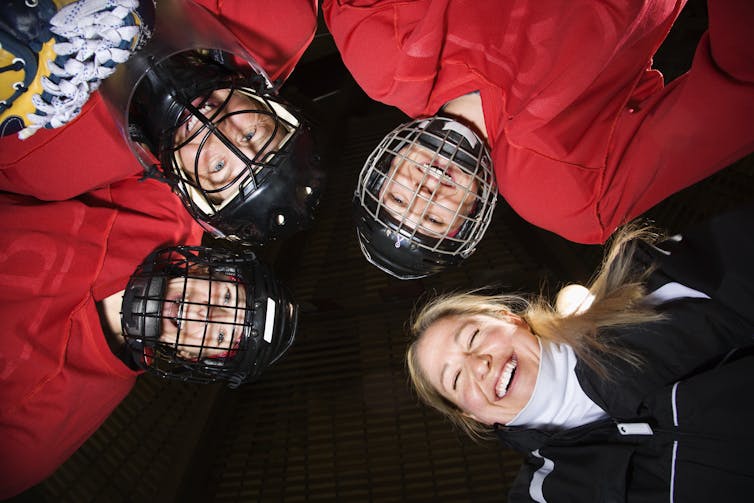There are success stories of mothers being physically active after childbirth — particularly in individual activities such as yoga, running, walking and other exercise. But what can be done to help postpartum moms participate in team sport?
Team sport is an important activity to explore because it provides opportunities to build community, enhance health and well-being, and counter the often unrealistic and self-sacrificing expectations of motherhood.
These expectations can include dedicating all of one’s time, energy and resources to be considered a “good mother” and managing a household while sacrificing leisure and sport participation.
Stories of pressures, resistance, support
As researchers in leisure studies and sport management, we recently published a study in which we worked with postpartum mothers (six weeks to one year post-childbirth) who participated in team sport.
Because we chose a research design that uses storytelling, below we share some excerpts of the postpartum mothers’ stories that describe the successes and challenges they experienced in team sport.
Michelle’s story of pressure
“Team sport helps me resist the pressures of motherhood more than any other sport. It’s something I do for myself, which is something you don’t have much of when you have kids. But there are also the pressures of motherhood. You want to give your kids everything, but you’re always questioning yourself. Am I giving enough time? Am I good enough? When can I take time for myself? Am I gonna impact the kids because I want time off? It’s never-ending, but it’s something you learn to live with. I always wonder if what I do is enough. I feel like a culprit if I take time off.”
As Michelle’s story reveals, the women felt the tension of successful participation alongside maintaining the “good mother” ideal — and this tension was always present.
Some participants told us stories of all the mental and physical work they had to do before they could participate in team sport. These included arranging childcare, making family dinners before they left, not leaving home until after the child(ren) were in bed. Feelings of guilt, social expectations to be “perfect mothers” and self-doubt remained present, especially before leaving to play.
Jennifer’s story of resistance

(Shutterstock)
“Coming back to hockey made me feel really empowered. I was getting a lot of kudos from the other moms being like ‘We can’t believe you’re back so early!’ Just being on a team full of moms is empowering. I also felt proud for coming back, and terribly out of shape. The most out of shape I have ever been in my life… But I was proud of myself for taking time for myself. I usually stay in the dressing room for a little bit longer than normal after games. I would be the last or second to last person in there because I was literally cherishing those two-and-a-half to three hours out of the house.”
Mothers’ participation in team sport often involved navigating challenges, such as lack of time, childcare and breastfeeding.
But the mothers shared stories of how much they valued team sport. Taking time for self-care through sport was an act of resistance against the expectation of being the “perfect mother.” The postpartum mothers also felt empowered as they resisted this expectation, which helped them feel more confident as women, athletes and mothers.
Celia’s story of support

(Shutterstock)
“While I was off, I was really looking forward to going back to sport, because I’m not someone who likes to go to the gym or do home body-weight exercises. When I went back to tennis, we made sure we had one extra player come along to always have an extra person to watch our babies. They all know that we have kids. People share the duty to sit on the bench and just move the stroller so they can continue sleeping. I was also cautious to have one more player for my return to volleyball to look after my baby.
The other day our fifth player was late. We played and (my baby) was mostly asleep during the first set, so I didn’t have to make any sacrifices because sport is important for our mental and physical health.”
Women in our study shared stories about the importance of support. Partners, family and friends provided important support to look after the baby.
Similar to the findings of previous research, these support networks were also essential in providing the postpartum mothers with emotional support and encouragement for their team sport participation.
Importantly, teammates also fostered a sense of community and support that encouraged players’ participation. They encouraged mothers to return to sport post-childbirth, maintained relationships with participants while on leave, and helped care for their babies on the sidelines.
The return to team sport is a messy process marked with feelings of resistance, empowerment, community and tension.
This research emphasizes the need for increased support for postpartum women to return to sport that is meaningful and empowering. Yet, it also shows the importance of changing the social expectations of self-sacrificing motherhood that challenges their well-being during a difficult life transition.




